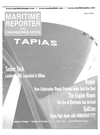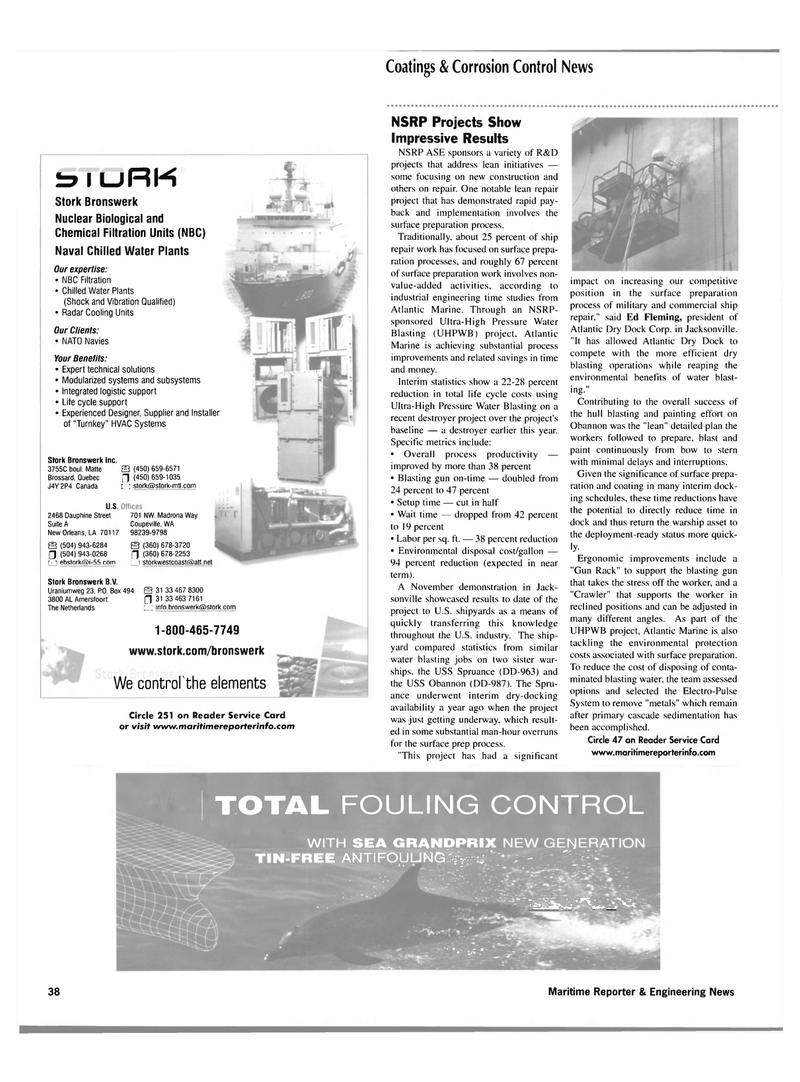
Page 38: of Maritime Reporter Magazine (March 2002)
Read this page in Pdf, Flash or Html5 edition of March 2002 Maritime Reporter Magazine
Coatings & Corrosion Control News
STORK
Our expertise: • NBC Filtration • Chilled Water Plants (Shock and Vibration Qualified) • Radar Cooling Units
Our Clients: • NATO Navies
Your Benefits: • Expert technical solutions • Modularized systems and subsystems • Integrated logistic support • Life cycle support • Experienced Designer, Supplier and Installer of "Turnkey" HVAC Systems
Stork Bronswerk Inc. 3755C bout Matte f (450) 659-6571
Brossard, Quebec (TJ (450) 659-1035
J4Y 2P4 Canada t ] [email protected]
Stork Bronswerk
Nuclear Biological and
Chemical Filtration Units (NBC)
Naval Chilled Water Plants
U.S. 2468 Dauphine Street
Suite A
New Orleans, LA 70117 701 NW. Madrona Way
Coupeville, WA 98239-9798
S3 (504)943-6284 • (504) 943-0268
L_J [email protected] © (360) 678-3720 (~J (360) 678-2253 ; [email protected]
Stork Bronswerk B.V.
Uraniumweg 23, RO. Box 494 £3 31 33 467 8300 3800 AL Amersfoort • 31 33 463 7161
The Netherlands : [email protected] 1-800-465-7749 www.stork.com/bronswerk
We control the elements
Circle 251 on Reader Service Card or visit www.maritimereporterinfo.com
NSRP Projects Show
Impressive Results
NSRP ASE sponsors a variety of R&D projects that address lean initiatives — some focusing on new construction and others on repair. One notable lean repair project that has demonstrated rapid pay- back and implementation involves the surface preparation process.
Traditionally, about 25 percent of ship repair work has focused on surface prepa- ration processes, and roughly 67 percent of surface preparation work involves non- value-added activities, according to industrial engineering time studies from
Atlantic Marine. Through an NSRP- sponsored Ultra-High Pressure Water
Blasting (UHPWB) project. Atlantic
Marine is achieving substantial process improvements and related savings in time and money.
Interim statistics show a 22-28 percent reduction in total life cycle costs using
Ultra-High Pressure Water Blasting on a recent destroyer project over the project's baseline — a destroyer earlier this year.
Specific metrics include: • Overall process productivity — improved by more than 38 percent • Blasting gun on-time — doubled from 24 percent to 47 percent • Setup time — cut in half • Wait time — dropped from 42 percent to 19 percent • Labor per sq. ft. — 38 percent reduction • Environmental disposal cost/gallon — 94 percent reduction (expected in near term).
A November demonstration in Jack- sonville showcased results to date of the project to U.S. shipyards as a means of quickly transferring this knowledge throughout the U.S. industry. The ship- yard compared statistics from similar water blasting jobs on two sister war- ships, the USS Spruance (DD-963) and the USS Obannon (DD-987). The Spru- ance underwent interim dry-docking availability a year ago when the project was just getting underway, which result- ed in some substantial man-hour overruns for the surface prep process. "This project has had a significant impact on increasing our competitive position in the surface preparation process of military and commercial ship repair." said Ed Fleming, president of
Atlantic Dry Dock Corp. in Jacksonville. "It has allowed Atlantic Dry Dock to compete with the more efficient dry blasting operations while reaping the environmental benefits of water blast- ing."
Contributing to the overall success of the hull blasting and painting effort on
Obannon was the "lean" detailed plan the workers followed to prepare, blast and paint continuously from bow to stern with minimal delays and interruptions.
Given the significance of surface prepa- ration and coating in many interim dock- ing schedules, these time reductions have the potential to directly reduce time in dock and thus return the warship asset to the deployment-ready status more quick- iy.
Ergonomic improvements include a "Gun Rack" to support the blasting gun that takes the stress off the worker, and a "Crawler" that supports the worker in reclined positions and can be adjusted in many different angles. As part of the
UHPWB project, Atlantic Marine is also tackling the environmental protection costs associated with surface preparation.
To reduce the cost of disposing of conta- minated blasting water, the team assessed options and selected the Electro-Pulse
System to remove "metals" which remain after primary cascade sedimentation has been accomplished.
Circle 47 on Reader Service Card www.maritimereporterinfo.com
TOTAL FOULING CONTROL
WITH SEA GRANDPRIX NEW GENERATION
TIN-FREE ANTIFOUUNG ; W- " : - : - : • - - — —z - . . - S <' •-».. - • - * - . _ or 38 Maritime Reporter & Engineering News

 37
37

 39
39
